 MyCatBreeds
MyCatBreeds Japanese Bobtail is originated from Japan but Cheetoh is originated from United States. Both Japanese Bobtail and Cheetoh are having almost same weight. Both Japanese Bobtail and Cheetoh has almost same life span. Both Japanese Bobtail and Cheetoh has same litter size. Both Japanese Bobtail and Cheetoh requires Low maintenance.
Japanese Bobtail is originated from Japan but Cheetoh is originated from United States. Both Japanese Bobtail and Cheetoh are having almost same weight. Both Japanese Bobtail and Cheetoh has almost same life span. Both Japanese Bobtail and Cheetoh has same litter size. Both Japanese Bobtail and Cheetoh requires Low maintenance.
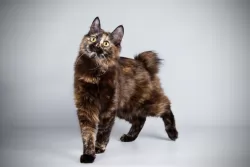 It is believed that these naurally-occuring short-tailed domestic cats in Japan arrived from the Asian continent about 1 000 years ago.
It is believed that these naurally-occuring short-tailed domestic cats in Japan arrived from the Asian continent about 1 000 years ago.
It was way back in 1602 that the Japanese authorities made it that all cats be released to tackle the rodent problem that were threatening the nation's silkworm population.
Bobtail cats were the street cats of Japan. In 1968, the cat was imported to the Western Hemisphere from Japan and in 1976 the shorthaired Japanese Bobtail was accepted for Championship status in the Cat Fanciers’ Association.
There are a number of cat’s breeders in North America and Europe, but it is still a rare cat. Today, the Japanese Bobtail is a recognized breed by all major registering bodies.
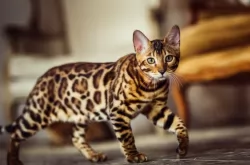 The Cheetoh is a beautiful cat whose parent breeds are the Ocicat and the Bengal.
The Cheetoh is a beautiful cat whose parent breeds are the Ocicat and the Bengal.
It was in 2001 that these two breeds were crossed by breeder Carol Drymon. Drymon was wanting to develop a new cat that would have characteristics similar to that of a wild cat but that would behave like a domesticated cat.
The Cheetoh became a recognized and registered breed with the United Feline Organization in November of 2004.
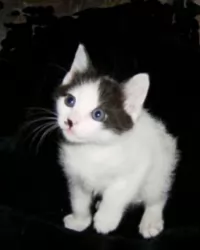 The medium-sized, long, lean and muscled Japanese Bobtail, with long slender legs, is known for its unusual bobtail. People liken the tail to that of a rabbit. The tail must always be visible though.
The medium-sized, long, lean and muscled Japanese Bobtail, with long slender legs, is known for its unusual bobtail. People liken the tail to that of a rabbit. The tail must always be visible though.
The head has a triangular shape and the neck is neither too long or too short. The ears are upright and set wide apart. The oval-shaped eyes are large.
The hind legs are longer than the front legs. The cat weighs between 3 and 6kg and comes in almost any color and pattern but it is thought that the triple-colored ones are the most favored in Japan.
The coat is of medium length and is soft and silky. The head of the cat is triangular with the ears being large and wide apart. The eyes are large and oval-shaped.
The Japanese Bobtail makes a good feline pet for families. They get on well with children and are affectionate and loving with all their human family members.
They’re talkative cats too, enjoying communication with people and using soft noises. It’s an intelligent cat and one that happens to love water too, and is a playful cat, making a great loyal companion.
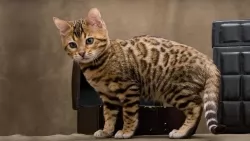 For a housecat, the Cheetoh is a muscular and large breed. In fact, this is one of the largest breeds of all the domesticated cats, with males being bigger than females. They can weigh anything between 7 and 10kg.
For a housecat, the Cheetoh is a muscular and large breed. In fact, this is one of the largest breeds of all the domesticated cats, with males being bigger than females. They can weigh anything between 7 and 10kg.
People want to own an animal that looks like a wild cat and the Cheetoh looks like a Cheetah. The coat of the cat can be several different colors and can be in different patterns with spots and stripes. He gets the spots from both the parent cats - the Ocicat and the Bengal. He definitely getd the longer legs from the Ocicat.
The purpose of the Cheetoh breeding program was to create an exotic, intelligent cat with a wild look and that would also be larger than your regular domestic cat. You could say it's the cats wonderfully soft, a velvety coat that makes it such an attractive cat.
Also, another notable feature with the cat is the way it walks - it looks as though it is stalking and prowling.
The cats are bred in 6 colors referred to as the black- or brown-spotted sienna, the black-spotted smoke the black- or brown-spotted gold, the black-spotted silver and the gold-spotted.
Your fascinating Cheetoh is a fun-loving cat, being playful and energetic and he will require a large yard and require being exercised.
They’re gentle cats but are talkative, being quietly friendly and social.
They make great family pets. They become devoted to their human family, being loyal and companionable. He is an affectionate, loving cat and his intelligence allows him to learn some simple commands and tricks.
He is the kind of cat that will do well in a family with kids and pets as he loves playfulness and fun, but he also wants to receive lots of love and attention.
 The Japanese Bobtail is such a sweet, playful, loving cat. The cat loves to be with his human family and is highly intelligent.
The Japanese Bobtail is such a sweet, playful, loving cat. The cat loves to be with his human family and is highly intelligent.
They are quite capable of learning tricks and playing games much like a dog. They are social cats and while they aren’t lap cats, they seek out the company of their human family, making use of a soft voice to communicate.
They’re such sweet cats and are adored by those who have brought them into their home as a pet and friend.
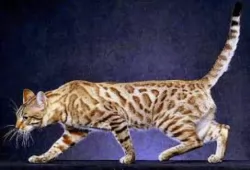 Cheetohs are a wonderful breed of cat and will love a busy household of adult humans, kids, and other pets.
Cheetohs are a wonderful breed of cat and will love a busy household of adult humans, kids, and other pets.
Remember that because of their wild side they have a high prey instinct and might like the idea of going after your small pets such as fish and birds.
Intelligent and playful you will need to keep your Cheetoh entertained and exercised with both mentally and physically stimulating puzzle-type games. One thing is for sure, with a Cheetoh in your home, you're never going to have a dull moment.
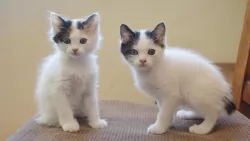 Just like any other cats, the Japanese Bobtail suffers from any one of the different health problems there are. The Japanese Bobtail is a healthy cat generally and he can easily reach 15 years of age with good care.
Just like any other cats, the Japanese Bobtail suffers from any one of the different health problems there are. The Japanese Bobtail is a healthy cat generally and he can easily reach 15 years of age with good care.
Look out for obesity. Obesity comes with a host of health issues, putting a strain on the cat’s joints as well.
You want to manage your furry friend’s food portions to ensure he remains lean and muscular. Feed your adult cat twice daily. Discover what your cat likes in terms of dry cat food, semi-wet or wet cat food.
Your cat is a carnivore and requires quality meaty foods. The best, high-quality cat foods always have meat at the top of the ingredients list as they need meat to get all the right nutrients in.
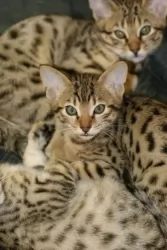 Whenever you buy a pet, particularly an exotic type of pet where you’ve spent a lot of money, make sure to check out potential health issues from the breeders.
Whenever you buy a pet, particularly an exotic type of pet where you’ve spent a lot of money, make sure to check out potential health issues from the breeders.
Always make sure to buy your cat from a reputable source to avoid health issues that could drastically shorten your Cheetoh cat’s life.
As with all cats, there are potential genetic problems in their ancestry that might reveal itself in your cat.
Certainly, if you suspect something is wrong, get your cat to the vet immediately.
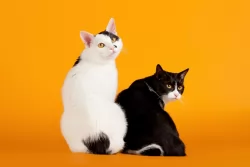 The cat’s medium coat sheds moderately, and a brush once a week to remove the loose hairs will be sufficient. You’ll want to brush him more often during his shedding seasons.
The cat’s medium coat sheds moderately, and a brush once a week to remove the loose hairs will be sufficient. You’ll want to brush him more often during his shedding seasons.
Help with keeping your Japanese Bobtail clean by scooping his droppings out of the litterbox at least every day and also changing the litter at least every week.
When you bring your Japanese Bobtail kitten home, you’ll have to take him to the vet. This is because from 8 weeks of age your kitten will need to get his first vaccines. Booster vaccines for your cat will also be required later on.
Provide your cat with a scratching post to prevent him from scratching your furniture.
Never leave your Japanese Bobtail without a constant supply of fresh, cool water.
Wash your cat’s water- and food bowls every second day to prevent bacteria from building up.
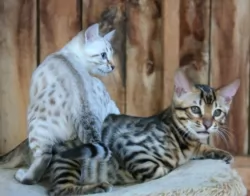 Although the Cheetoh is considered to be a hypoallergenic cat, no cat is really so, but nonetheless the coat is lovely and velvety and is shiny and short, being low shedding as well.
Although the Cheetoh is considered to be a hypoallergenic cat, no cat is really so, but nonetheless the coat is lovely and velvety and is shiny and short, being low shedding as well.
He will need lots of exercise, but luckily with his dog-like attributes, he can be taught to walk on a leash,
Ensure your cat has a nice dry, warm sleeping area.
These are energetic cats and he will need a complete commercially manufactured cat food that is high in protein, after all this is a carnivore and they require meaty diets.
If in any kind of doubt as to what to feed your Cheetoh, speak with your veterinarian if you have any concerns.
Make sure that your cat is never without a constant supply of fresh, cool water. A water fountain, with moving water, always encourages water drinking with cats.